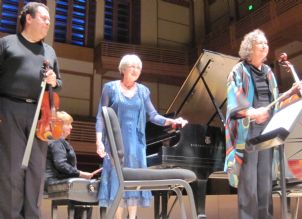|
Symphony
FROM THE NEW WORLD TO THE OLD WORLD
by Peter Lert
Saturday, June 14, 2025
Chamber
MC2 DUO RECITAL CLOSES 222'S SEASON
by Terry McNeill
Saturday, June 14, 2025
Choral and Vocal
CANTIAMO SONOMA'S LUSCIOUS A CAPELLA SINGING IN SEASON ENDING CONCERT
by Pamela Hicks Gailey
Sunday, June 8, 2025
Symphony
SRS SEASON ENDS WITH RESOUNDING TA-TA-TA-BANG
by Terry McNeill
Sunday, June 1, 2025
Symphony
YOUTHFUL VIRTUOSITY ON DISPLAY AT USO'S MAY CONCERTS
by Peter Lert
Saturday, May 17, 2025
Symphony
MYSTICAL PLANETS AND LIVELY GERSHWIN ORTIZ AT FINAL SRS CONCERT
by Peter Lert
Sunday, May 4, 2025
Symphony
VSO'S CONCERT MUSIC OF TIME, MUSIC OF PLACE
by Peter Lert
Sunday, April 27, 2025
VOCAL ELEGANCE AND FIRE AT THE 222'S RECITAL APRIL 26
by Pamela Hicks Gailey
Saturday, April 26, 2025
CANTIAMO SONOMA SINGS AN INSPIRED GOOD FRIDAY MOZART REQUIEM CONCERT
by Pamela Hicks Gailey
Friday, April 18, 2025
DRAMATIC SHOSTAKOVICH SYMPHONY CLOSES PHILHARMONIC'S 25TH SEASON
by Terry McNeill
Sunday, April 13, 2025
|
 |
 Trio Navarro April 6 in Weill Hall |
THEMATIC OPULENCE FROM THE TRIO NAVARRO
by Terry McNeill
Sunday, April 6, 2014
Northern California’s Trio Navarro presented just two works in an April 6 Weill Hall concert, an event with consummate playing, inspired drama and ample thematic richness.
Schubert’s B-Flat Major Trio, D. 898, was the evening’s highlight and was familiar fare for the estimable Navarro. The wonderful opening Allegro Moderato was initially played with restraint but became warmly lyrical in the exposition and development, yet devoid of any sentimentality. This is music of eternal sunshine.
The sublime Andante featured the duet work of cellist Jill Rachuy Brindel and violinist Victor Romasevich. Their playing was tender but without the slow tempo and sweeping ritards of the iconic Cortot-Thibaud-Casals recording. The many modulations were deftly performed and the ensemble balanced. Pianist Marilyn Thompson was always discretely supportive. With only 65 in the hall that seats more than 1,400, the Trio’s sound was direct and clear below a mezzo-forte with a long reverberation time.
In the concluding Scherzo and Rondo movements the work’s length in less capable hands can sound overly extended, but the Navarro shaped the rise and fall of phrases lovingly, and the chorale in the Scherzo’s middle was elegant. After all, for musicians Schubert has heavenly length.
After intermission Arensky’s first Trio, the now-popular D Minor of Op. 32, was played very well but in the end wasn’t totally convincing. As with the Schubert, the Navarro opted for tempos that were at times brisk with repeats played at a volume and with rhythms that were the same as in exposition. It worked well with the Schubert but didn’t quite capture the ambiance in music inspired by Tchaikovsky and foreshadowing Rachmaninoff.
The majestic first movement theme was played strongly but tonally thin by Mr. Romasevich, and the piano sound in fast runs at half pedal was indistinct and lacking the needed finger staccato. Acoustics in the nearly empty hall contributed to this pianistic blur; the opening of the smaller Schroeder Hall cannot come too soon. The trio in the Scherzo was played in a gay style, almost a waltz, and Arensky’s melodic gifts were spotlighted in the Elegia, begun with Mr. Romasevich’s retuning his violin and a subsequent fervid low register duet with Ms. Brindel.
In sum the performance was never pedestrian but also never quite seized Arensky’s subtle lyricism and late romantic-era phrasing. Clearly Arensky’s neglected second Trio in F Minor, with its poetic cello writing, should be on the Navarro’s list of scores to perform.
|

